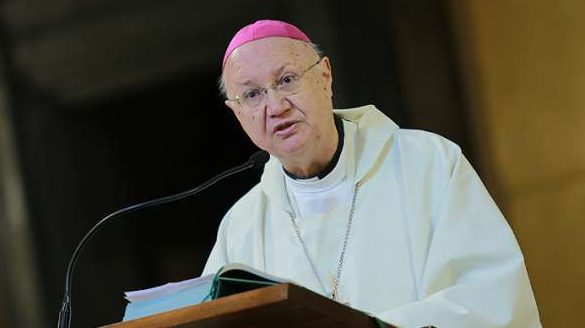With the Vatican’s interim deal with the Chinese government due to expire in September, an archbishop who helped to negotiate the agreement said this week that he believes it should be renewed for one or two more years.
Archbishop Claudio Maria Celli was instrumental in the negotiation and signing of the 2018 agreement between the Holy See and China that regularized the country’s government-appointed bishops who had been out of communion with Rome.
“The deal is an interim deal, which expires, as you said, in September of this year. We have to find a formula. We have to see what to do after this deadline. I think we should probably reconfirm it for one or two years,” Archbishop Claudio Maria Celli said in an Italian television interview June 7.
“However, the Holy See has not yet made a decision in this regard, a decision that will then be communicated to the Chinese authorities,” he added.
After the Vatican signed the interim agreement with Chinese Communist Party authorities on the appointment of bishops in September 2018, Chinese government persecution of Catholics continued with the demolition of churches and crosses and the continuing detention of underground clergy.
“It is undeniable that they are still situations that still require a journey,” Celli said in an interview with Tgcom24 television program Stanze Vaticane.
The archbishop, a long-serving Vatican diplomat who was president of the Pontifical Council for Social Communications from 2007 to 2016, spoke of the “need for respect” and for “mutual understanding” between the Catholic Church and China.
“It will not be easy. The Holy See still wants to continue on this step. We want to move forward and we want to reach a normality in which a Chinese Catholic can express all of his fidelity to the Gospel and also with respect for his being Chinese,” Celli said.
“I always say, I use a very simple expression, that the Catholic Church in China must be fully Chinese, but it must also be fully Catholic,” he added.
Vatican Secretary of State Cardinal Pietro Parolin, a key figure in the Vatican’s ongoing negotiations with China, has compared the Catholic missionary practice of “inculturation” to the Chinese government’s term, “sinicization.” The cardinal said in 2019 that inculturation and sincization can be “complementary” and “can open avenues for dialogue.”
Since coming to power in 2013, Chinese President Xi Jinping has mandated the “sinicization” of all religions in China, a move which the U.S. Commission on International Religious Freedom called “a far-reaching strategy to control, govern, and manipulate all aspects of faith into a socialist mold infused with ‘Chinese characteristics.’’’
The Chinese government is in the midst of implementing a five-year “sinicization plan” for Islam, a religion that has faced increased persecution in the country with at least 800,000 Uyghur Muslims held in internment camps.
Catholic acceptance of the “sinicization” program has been a much-discussed topic following the signing of the 2018 agreement between the Vatican and China. Most recently a state-affiliated Chinese Catholic Patriotic Association in Zhejiang province issued a statement requiring “patriotism” to be added to the celebration of the liturgy as a condition for churches reopening.
In a video announcing the pope’s prayer intention for March as a prayer for “the unity of Christians in China,” Pope Francis said: “The Church wants Chinese Christians to be truly Christians, and to be good citizens.”
Pope Francis also added this line to his prayer May 24 entrusting China to Mary. The pope added “and good citizens” to the end of his prepared petition that Chinese Catholics may be “joyful witnesses and promoters of charity and fraternal hope.”
The terms of the 2018 interim agreement have not been released, however Pope Francis gave some insight into the process that led to its signing in an interview on Sept. 25, 2018, two days after the agreement was signed.
“You know that when you make a peace agreement or a negotiation, both sides lose something,” Pope Francis said. “This is the law. Both sides. And you move ahead.”
He said that “the bishops who were in difficulty were studied case-by-case,” and that “dossiers came on to my desk about each one. And I was responsible for signing the case of the bishops.”
Following this, drafts of the agreement were put on his desk, Pope Francis said. They were discussed and “I gave my ideas.”
He stated that under the agreement with China, the Chinese government will not appoint the bishops: “No, this is a dialogue about eventual candidates but Rome appoints, the Pope appoints.”
“I signed the agreement,” Pope Francis stated. “I am responsible.”
“The others, whom I appointed, in all have worked for more than 10 years. It’s not an improvisation. It’s a path, a true path.”
Pope Francis noted the efforts of Archbishop Celli, along with Cardinal Pietro Parolin and Fr. Rota Graziosi, an official in the Roman Curia, in forming the 2018 interim agreement.
“We do not look only at the present, but we try to look to the future and give the future of our relationship a deep and respectful basis and I would say that we are working in this direction,” Celli said of the ongoing negotiations over renewal of the agreement.
“On our journey we must all be faithful to the Gospel,” he said. “It is not an easy path, but it seems to me that we have embarked on a respectful path … trying to understand each other in order to be able to see how to still resolve those knots that remain, and those situations that undeniably leave much more than thoughtful, I would say worried.”
“However we must carry it forward,” Celli said.

